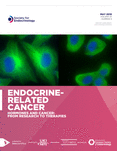mTOR, a novel target in breast cancer: the effect of CCI-779, an mTOR inhibitor, in preclinical models of breast cancer.
Abstract
The mammalian target of rapamycin (mTOR) is a central regulator of G1 cell cycle protein synthesis that precedes commitment to normal cellular replication. We have studied the effect of cell cycle inhibitor-779 (CCI-779), a rapamycin ester that inhibits mTOR function, on the proliferation of a panel of breast cancer cell lines. Six of eight lines studied were sensitive (IC(50)< or = 50 nM) and two lines were resistant (IC(50)>1.0 microM) to CCI-779. Sensitive lines were estrogen dependent (MCF-7, BT-474, T-47D), or lacked expression of the tumor suppressor PTEN (MDA-MB-468, BT-549), and/or overexpressed the Her-2/neu oncogene (SKBR-3, BT-474). Resistant lines (MDA-MB-435, MDA-MB-231) shared none of these properties. CCI-779 (50 nM) inhibited mTOR function in both a sensitive and a resistant line. In nu/nu mouse xenografts, CCI-779 inhibited growth of MDA-MB-468 (sensitive) but not MDA-MB-435 resistant tumors. Treatment of sensitive lines with CCI-779 resulted in a decrease in D-type cyclin and c-myc levels and an increase in p27(kip-1) levels. There was good correlation between activation of the Akt pathway and sensitivity to CCI-779. Amplification of mTOR-regulated p70S6 kinase, which is downstream of Akt, may also have conferred CCI-779 sensitivity to MCF-7 cells. Taken together, the data suggest that mTOR may be a good target for breast cancer therapy, especially in tumors with Akt activation resulting from either growth factor dependency or loss of PTEN function.












